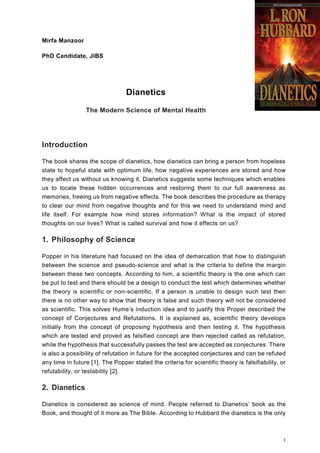Not known Factual Statements About Dianetics
Not known Factual Statements About Dianetics
Blog Article
Dianetics Things To Know Before You Buy
Table of ContentsThe Main Principles Of Dianetics The smart Trick of Dianetics That Nobody is Talking AboutThe smart Trick of Dianetics That Nobody is Discussing4 Easy Facts About Dianetics Shown
I could not ever before not wish to get anything that comes to mind for you- if it was or else, I would not be sitting below with you, doing this. I not only can never have a trouble, or not desire to hear something that comes to mind for you, however I'm entirely anxious to know every idea, every thought, every image or sensation that arises or materializes for you- don't ever before believe or else, and if somehow you do, please just let me recognize! Sometimes, you may have a thought, and image, concept or event pop up that does not appear to respond to the concern, or associate to it, yet nonetheless, always do inform me concerning it, and as we continue, the relevance will certainly emerge for you.This is intrinsic in the basis of handling, and the topic of this conversation: the basic roles of the counselor and the client: The basic role of the therapist is, unlike "typical training", not to control, which indicates to enforce and/or inhibit, but to instead work from the basis of EMPOWERING THE CLIENT.

Rumored Buzz on Dianetics
John Mcmasters expressed this standard reality splendidly well in one of his lectures on Power handling, in which he explains exactly how he was asked what this "unique flair" was that he had for giving such terrific sessions; he needed to consider that for a minute, and identified that it was what he had not been doing, in addition to what he was doing: he had not been evaluating, judging, computing, or in fact, generating any type of ideas, allow alone spoken expressions, after giving the command and while waiting for the computer to finish their response to their fulfillment; he was, simply and just, existing with the computer, and completely interested.
The duty of the therapist, showed; that was his "unique propensity". I have actually had my very own experience which showed me this well, extremely early in the game. In 1982, having actually just recently finished my training and teaching fellowship on New Period Dianetics, I was running this on a COMPUTER, and there was a factor in the session where (being a bit wet behind the ears not yet having numerous hours under my belt as a professional auditor) the PC appeared to be "taking as well long" to express anything vocally after I gave him a command.
This secret ended up being one of see here now the most valuable payment that John ever made to the topic of treatment or auditing (Dianetics). In my simple opinion, it is the best payment that anybody has actually ever before made to these subjectsthe application is completely non-judgemental, non-evaluative, and empty of any kind of pointer, suggestions or opinion.no preconceived program click for info for individuals, or 'degrees' that they have to do
In Idenics, the only source of info about a client is the specific customer. In Scientology we prided ourselves on not assessing for individuals. But all that actually meant was that the auditor did not vocally review for the computer in session. The registrars and values officers evaluated for the computer.
The 45-Second Trick For Dianetics

Any individual that had actually ever seen John audit might not index aid yet observe a special quality in his bookkeeping."The client's standard role is to be there with the function of relocating in the direction of their spiritual goals, and to openly and completely share and experience whatever manifests for them in answering the concerns and executing the directions in the handling.
This is something to procedure as required. Also, individuals often have previous experience and/or indoctrination in auditing/processing which, in some means, and to some degrees, really misdirects them into perspectives, concepts and habits patterns that protect against the complete realization of these functions, and so they will certainly have a tendency to inhibit the expressing of what comes to mind, as in the instances given over - Dianetics. * The initial, and perhaps leading instances of mis-indoctrination bring about less than completely smooth and reliable sessions, can be found in specific aspects of the training routines, or "TR's":"TR's" are often an individual's very first, or a minimum of early, experience in Scientology, and while I will go on to describe what I see as the problems in concept and technique, nonetheless, tend to be considerably therapeutic, done as they are offered (Hubbard insists that "TR's are not processing, they are educating", however factually, they are both processing AND training)
Alan Walter made comparable observations, and improved these with his "Presence Processes". There is no "flunking", and no rejection of the truth of this being processing. The emphasis, as it needs to be, gets on experiencing the other person's existence. All the symptoms which obtain a "flunk" in doing "TR-0" are merely the being's initiatives to withstand the other individual's existence, and instead than being harassed and pestered with "Flunk", which imposes "failure!" on the being, one simply needs to be urged to "stick their feet in the water a little much deeper", to increasingly rehabilitate their capability and readiness to fully share and experience "being below", or "presence", with others.
The 5-Minute Rule for Dianetics

Report this page